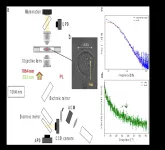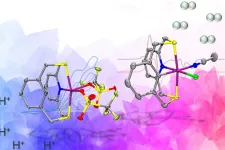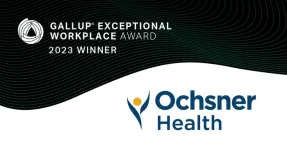(Press-News.org) It has been a longstanding assumption that birth mode and associated exposure of newborns to their mothers’ vaginal microbiome during delivery greatly affects the development of babies’ gut microbiome.
To test the scientific validity of this assumption, a team of Canadian researchers has now published a study in Frontiers in Cellular and Infection Microbiology in which they examined the effect of maternal vaginal microbiome composition on the development of infants’ stool microbiome at 10 days and three months after birth.
“We show that the composition of the maternal vaginal microbiome does not substantially influence the infant stool microbiome in early life,” said Dr Deborah Money, a professor of obstetrics and gynecology at the University of British Columbia and corresponding author of the study. “It does not appear that exposure to maternal vaginal microbiota at the time of vaginal birth establishes the infant stool microbiome.”
Unpredictable baby gut microbiome
For their study, which is one of the largest mother-infant cohort studies to date, the researchers recruited more than 600 Canadian women who planned to deliver both vaginally and via C-section.
Maternal vaginal swabs were collected prior to delivery. Stool samples from the babies were collected within 72 hours of delivery, as well as at 10 days and three months after birth.
The scientists found that regardless of birth mode and concomitant exposure to maternal microbiome, mothers’ vaginal microbiome composition does not predict the composition of babies’ stool microbiome at 10 days or three months after birth.
“From this study and other follow-up work, we were able to show that transfer of vaginal bacteria to the infant gut is limited, and that the maternal vaginal microbiome is not a large contributor to the bacterial community that develops in a baby’s gut after birth,” said Scott Dos Santos, a PhD candidate at the University of Saskatchewan who conducted the lab work and data analysis. “On the contrary, other maternal sources like breast milk and exposure to the environment likely play a much larger role.”
The research team is conducting further work to analyze the breast milk microbiome and better understand its relationship with infants’ gut microbiome.
Antibiotic use may explain microbiome discrepancies
Yet, at both 10 days and three months, the scientists found statistically significant differences in microbiome composition by mode of delivery. To investigate how these might be explained, they looked at clinical factors.
“The differences we found between infants stool microbiome composition by mode of delivery in early life seemed to be primarily influenced by exposure to antibiotics around the time of birth,” explained Money.
The researchers’ assessment of antibiotic use did not disprove the finding that the maternal vaginal microbiome is not predictive of infant stool microbiome composition.
Large dataset for robust results
Study participants were recruited from three hospitals across British Columbia to ensure a large, sociodemographically diverse and multi-ethnic study population. It was also vital to recruit enough individuals who planned to deliver vaginally or by C-section to secure appropriate participants for both groups of interest.
“This study underscores the need for robust methods with large enough sample sizes to ensure clinical conclusions drawn from human microbiome studies allow one to control for factors affecting natural variability in human microbiomes across individuals,” Money stressed.
The researchers also pointed to the study’s limitations: “We did not plan to, nor did we collect maternal stool microbiome samples, so we cannot draw any conclusions on this as an influence,” Money pointed out.
END
Babies’ gut microbiome not influenced by mothers’ vaginal microbiome composition
Scientists find that maternal vaginal microbiomes do not appear to be a key driver in determining infant stool microbiome composition during first weeks and months
2023-03-30
ELSE PRESS RELEASES FROM THIS DATE:
2023 Canada Gairdner Awards recognize world-renowned scientists for transformative contributions to research impacting human health
2023-03-30
The Gairdner Foundation is pleased to announce the 2023 Canada Gairdner Award laureates, recognizing some of the world’s most significant biomedical and global health research and discoveries.
“Congratulations to all the 2023 Canada Gairdner Award recipients! The ground-breaking work of this year’s laureates has resulted in innovative, globally accessible tools to fight diseases and improve our well-being. The work of two Canadian researchers – Dr. Christopher Mushquash and Dr. Gelareh Zadeh especially ...
Researchers use tiny diamonds to create intracellular sensors
2023-03-30
Researchers use tiny diamonds to create intracellular sensors
Optically trapped nanodiamonds could be used to measure temperature, magnetic fields and other properties inside living cells
VANCOUVER -- Researchers have developed a new way to study the intricate dynamics within living cells by using optically trapped nanodiamond particles as intracellular sensors. Using custom built optical tweezers, the research team trapped the particles within the cell at low power while the cell was alive. The work represents an important advancement in quantum sensing, which takes advantage of quantum mechanics to analyze changes at the atomic level.
The researchers used optical tweezers ...
New study identifies key risk factors for surgical site infection following commonly performed surgery
2023-03-30
Arlington, Va., March 30, 2023 – Findings from an analysis of more than 66,000 abdominal hysterectomies performed in New York hospitals reveal key risk factors for surgical site infections (SSIs) following these procedures, including open surgery, obesity, diabetes, gynecological cancer, and age under 45. Published today in the American Journal of Infection Control (AJIC), the data can help inform surgical and clinical decisions to reduce post-operative infections.
“Improved understanding of patient-related, clinical, and surgical factors ...
Limit screen use in children under six, says psychologist
2023-03-30
“Children who are in regular contact with mobile phone screens, tablets or computers are more irritable and have worse attention, memory and concentration than those who do not use them.”
Parents should strictly ration or not allow screen time for children aged under six, according to a leading neuropsychologist in a new book.
Dr Álvaro Bilbao, Ph.D., uses current and established research to highlight how the risk of psychological and behavioral issues increases the ...
Most of world’s salt marshes likely to be underwater by 2100, study concludes
2023-03-29
By Emily Greenhalgh
WOODS HOLE, MASS. -- Cape Cod’s salt marshes are as iconic as they are important. These beautiful, low-lying wetlands are some of the most biologically productive ecosystems on Earth. They play an outsized role in nitrogen cycling, act as carbon sinks, protect coastal development from storm surge, and provide critical habitats and nurseries for many fish, shellfish, and coastal birds.
And, according to new research from the Marine Biological Laboratory (MBL), more than 90 percent of ...
Insilico Medicine featured in BBC-produced series on biotech breakthroughs
2023-03-29
Insilico Medicine (“Insilico”) is featured in the new BBC StoryWorks-produced film series Nature’s Building Blocks made in conjunction with the Biotechnology Innovation Organization (BIO). Through 29 short films, the series showcases science innovations and cutting-edge technological advances that are poised to dramatically improve human life.
Insilico, a generative artificial intelligence (AI)-driven drug discovery company, is featured in a segment focused on democratizing and accelerating ...
A reconstruction of prehistoric temperatures for some of the oldest archaeological sites in North America
2023-03-29
Scientists often look to the past for clues about how Earth’s landscapes might shift under a changing climate, and for insight into the migrations of human communities through time. A new study offers both by providing, for the first time, a reconstruction of prehistoric temperatures for some of the first known North American settlements.
The study, published in Quaternary Science Reviews, uses new techniques to examine the past climate of Alaska’s Tanana Valley. With a temperature record that reaches back 14,000 years, researchers now have ...
Mimicking biological enzymes may be key to hydrogen fuel production
2023-03-29
CHAMPAIGN, Ill. — An ancient biological enzyme known as nickel-iron hydrogenase may play a key role in producing hydrogen for a renewables-based energy economy, researchers said. Careful study of the enzyme has led chemists from the University of Illinois Urbana-Champaign to design a synthetic molecule that mimics the hydrogen gas-producing chemical reaction performed by the enzyme.
The researchers reported their findings in the journal Nature Communications.
Currently, industrial hydrogen is usually produced by separating hydrogen gas molecules from oxygen atoms in water using a process called ...
Ochsner Health named 2023 Gallup Exceptional Workplace Award Winner
2023-03-29
NEW ORLEANS, LOUISIANA— Ochsner Health, Louisiana’s largest nonprofit, academic, multi-specialty, healthcare delivery system, has received the 2023 Gallup Exceptional Workplace Award (GEWA). This award recognizes the most engaged workplace cultures in the world.
After another year of unpredictability in the workplace, Gallup found that Ochsner Health continued to put their employees’ engagement at the center of their business strategy, embedding engagement into their very culture.
“Our employees are the reason for the culture of positive engagement at Ochsner Health. From physicians and providers to clinical ...
Heart attack study could change the game in regenerative medicine
2023-03-29
LA JOLLA, CALIF. Mar 29, 2023 - Sanford Burnham Prebys researchers have identified a group of proteins that could be the secret to cellular reprogramming, an emerging approach in regenerative medicine in which scientists transform cells to repair damaged or injured body tissues. The researchers were able to reprogram damaged heart cells to repair heart injuries in mice following a heart attack. The findings, which appear in the journal Nature Communications, could one day transform the way we treat a variety of diseases, including cardiovascular disease, Parkinson’s ...
LAST 30 PRESS RELEASES:
ASU researchers to lead AAAS panel on water insecurity in the United States
ASU professor Anne Stone to present at AAAS Conference in Phoenix on ancient origins of modern disease
Proposals for exploring viruses and skin as the next experimental quantum frontiers share US$30,000 science award
ASU researchers showcase scalable tech solutions for older adults living alone with cognitive decline at AAAS 2026
Scientists identify smooth regional trends in fruit fly survival strategies
Antipathy toward snakes? Your parents likely talked you into that at an early age
Sylvester Cancer Tip Sheet for Feb. 2026
Online exposure to medical misinformation concentrated among older adults
Telehealth improves access to genetic services for adult survivors of childhood cancers
Outdated mortality benchmarks risk missing early signs of famine and delay recognizing mass starvation
Newly discovered bacterium converts carbon dioxide into chemicals using electricity
Flipping and reversing mini-proteins could improve disease treatment
Scientists reveal major hidden source of atmospheric nitrogen pollution in fragile lake basin
Biochar emerges as a powerful tool for soil carbon neutrality and climate mitigation
Tiny cell messengers show big promise for safer protein and gene delivery
AMS releases statement regarding the decision to rescind EPA’s 2009 Endangerment Finding
Parents’ alcohol and drug use influences their children’s consumption, research shows
Modular assembly of chiral nitrogen-bridged rings achieved by palladium-catalyzed diastereoselective and enantioselective cascade cyclization reactions
Promoting civic engagement
AMS Science Preview: Hurricane slowdown, school snow days
Deforestation in the Amazon raises the surface temperature by 3 °C during the dry season
Model more accurately maps the impact of frost on corn crops
How did humans develop sharp vision? Lab-grown retinas show likely answer
Sour grapes? Taste, experience of sour foods depends on individual consumer
At AAAS, professor Krystal Tsosie argues the future of science must be Indigenous-led
From the lab to the living room: Decoding Parkinson’s patients movements in the real world
Research advances in porous materials, as highlighted in the 2025 Nobel Prize in Chemistry
Sally C. Morton, executive vice president of ASU Knowledge Enterprise, presents a bold and practical framework for moving research from discovery to real-world impact
Biochemical parameters in patients with diabetic nephropathy versus individuals with diabetes alone, non-diabetic nephropathy, and healthy controls
Muscular strength and mortality in women ages 63 to 99
[Press-News.org] Babies’ gut microbiome not influenced by mothers’ vaginal microbiome compositionScientists find that maternal vaginal microbiomes do not appear to be a key driver in determining infant stool microbiome composition during first weeks and months






